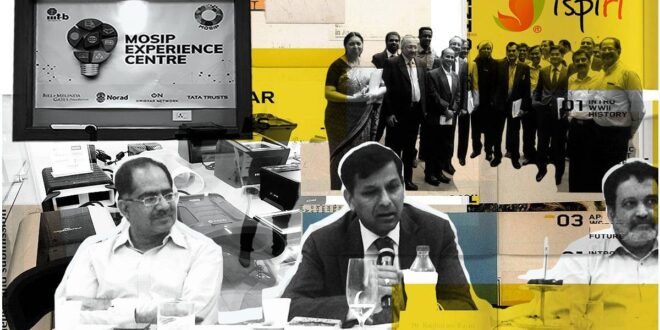Bengaluru, Delhi: Rajni, a vegetable vendor in rural India, sits on the ground. A selection of fresh produce, vegetables she bought using the money she borrowed from a local lender that morning, is laid out in front of her.
As she makes her sales, she is acutely aware of the amount she needs to return to the money lender by the end of the day, exorbitant interest included. Tomorrow, she will start this same process all over again.
Rajni could be any one of the millions around the country with no access to formal financing, who are trapped in a world of loan sharks, high interest rates and commissions.
To have a loan officer go to Rajni and do the paperwork might cost a formal lender about Rs 1,500, which is not a viable option when she probably only needs a Rs 500 intraday loan.
Now, imagine another Rajni, one who has access to India’s digital revolution. This Rajni can access credit on her smartphone from the formal financial sector at a lower interest rate than what informal lenders would charge. And this licensed lender can verify her identity digitally.
What’s more, she no longer needs to visit the lender to repay her loan. A few taps on her UPI app are enough.
This facility has arrived at Rajni’s fingertips thanks to the digital infrastructure enabled by India Stack, a project conceived by the think tank iSPIRT.
Rajni — an entity based on a real person that members of iSPIRT met during a field visit to rural India in 2014 — is all-important to the Bengaluru-based think tank. Serving her drives iSPIRT.
No non-governmental organisation can rival iSPIRT’s ability to make civil servants and politicians see the future as they see it and influence policy to bring that future to pass.
If India is the world’s cautionary tale for poverty and pollution, that idea is changing with the country’s economy going digital — mostly thanks to iSPIRT, which is as influential among private companies and start-ups, as it is with the government.
iSPIRT — or the ‘Indian Software Product Industry Roundtable’ — officially launched in 2013, but the volunteer movement behind its ‘India as a Product Nation’ movement has been around since 2009 as a silent operator in the tech policy scene.
Phonetically pronounced ‘eye-spurt’, and more popularly called ‘eye-spirit’, iSPIRT represents different things to different people.
Some see it as the organisation that came up with uses for Aadhaar and ruined people’s privacy for the sake of profit. Others see it as being even more powerful than the government think tank NITI Aayog.
iSPIRT is registered as a non-profit think tank that picks problems it can solve, especially using technology, over the long term, taking, say, even 30 years — longer than any government’s tenure. So, the organisation remains “apolitical”, said an iSPIRT member who wished to not be named.
“We have come this far since 2009 by keeping a low profile,” the member added. “We don’t want to let our no-greed, no-glory volunteering be diluted. Volunteer organisations like ours are like fragile plants in the world today.”
But if one had to summarise a decade of iSPIRIT’s complex body of work, it could be done in two words — India Stack.
India Stack is a set of Application Programming Interfaces (APIs) that software developers can access for free. Its identity verification-related APIs, like eAuth, eKYC, QR code scanning, can be used to verify a person’s identity against the Aadhaar database. It also has eSign as an API, so that an Aadhaar holder can provide a legally-accepted digital signature for a document, like a loan agreement.
The India Stack website says it has facilitated 63.6 billion e-authentications, and 10.4 billion eKYCs. None of this would have been humanly possible without a software solution.
“They are staggering numbers that are hard to comprehend. We don’t really appreciate the amount of work and transformation they represent,” said Sanjay Anandaram, global ambassador at iSPIRT.
It also offers a ‘DigiLocker’, a public utility provided to Aadhaar holders by the Government of India, where one can store all their loan documents and where banks can directly send documents.
Also read: India building the future it desires with its own digital infrastructure. EU can learn
Using tech to help Rajni
The payments layer of India Stack has options like the mega-hit UPI (Unified Payments Interface), and others like Aadhaar Payment Bridge, and Aadhaar Enabled Payment Service.
Before 2013, if Rajni took a loan from the formal sector, she would still likely have to use a debit card to pay it back and the card company would charge a 1 per cent commission.
“Card companies initially said the commission can be halved, but what is the use of taking away the commission from a money lender and giving it to a multinational card company?” said Sharad Sharma, co-founder, iSPIRT. “That’s why UPI was conceived, so that Rajni can receive and send money faster, and cheaper.”
“UPI does more transactions than all the card companies combined in India,” added Sharma.
While the Rajni use case is still to be realised, enough progress has been made so that small GST-paying businesses can get short-tenor cash-flow loans online.
Also read: UN panel lauds India for economic inclusion in its digital initiatives
The spirit behind iSPIRT
iSpirt was co-founded by Sharad Sharma, former chair at NASSCOM Product Forum, Vishnu Dusad, Managing Director (MD) of Nucleus Software, Bharat Goenka, Co-founder and MD of Tally Solutions, and Avinash Raghava, former Accel executive.
It was launched to encourage Indian software developers to think beyond run-of-the-mill engineering work, and performing basic outsourced projects, and apply their skills to build great things out of India.
To tech philanthropists like Bill Gates, iSPIRT’s work has helped India reach a point where the country is on the “cusp of leapfrogging” into a digital and financially-inclusive version of itself.
In 2017, Kiran Jonnalagadda, founder of the Internet Freedom Foundation and a critic of Aadhaar, wrote about iSPIRT and said this about Sharad Sharma: “His enthusiasm and energy for his causes are unparalleled… Sharad is a powerful figure, perhaps the only one with a reach spanning from small, unfunded start-ups to the upper bureaucracy of government. You want to be on Sharad’s good side.”
Sharma is a member of the National Start-up Advisory Council (NSAC) and SEBI’s Committee on Financial and Regulatory Technologies (CFRT). He has also served on the RBI’s U.K. Sinha-led committee to study the problems faced by MSMEs, and a committee constituted by the Central government to promote digital payment systems.
ThePrint met Sharma at one of his favourite haunts, a co-working space in Bengaluru — the other being the Karnataka Golf Association. Speaking about iSPIRT, he said that, to him the organisation is a bit like ‘The Lunar Men’ from Jenny Uglow’s 2002 eponymous book.
The Lunar Men is the story of how five curious friends living in late-18th-century Birmingham changed the world as they met and discussed ideas on the Mondays “nearest the full moon, to have light to ride home”.
These were men that did ground-breaking things. “The ‘Lunar Men’ build factories, plan canals, make steam engines thunder. They discover new gases, new minerals and new medicines…,” Uglow writes.
Sharma feels that India’s ‘lunar men’ at iSPIRT have a crazy goal too — to use internet and software to change the structure of the country’s economy and improve the citizens’ quality of life.
That crazy goal has a far-reaching ripple effect as it “becomes a way to build India’s soft power through digital public goods”, said iSPIRT’s Sanjay Anandaram.
It’s already well on its way to achieving this. Even before India gets a permanent seat on the UN Security Council, iSPIRT has raised India’s profile by co-founding ‘The Digital Public Goods Alliance’ and becoming a board member alongside UN agencies in the organisation set up “to end poverty, protect the planet, and improve the lives and prospects of everyone, everywhere” using open source software.
iSPIRT became popular after its name came to be associated with Infosys co-founder Nandan Nilekani and Aadhaar. It grew in influence because it worked on building authentication services around Aadhaar, a project of national importance backed by Nilekani.
According to Sharma, Nilekani continues to be a mentor to iSPIRT and is an evangelist of its work.
When the Unique Identification Authority of India (UIDAI) was set up to create Aadhaar in 2009, some of the key tech people who worked there with Nilekani were Sanjay Jain and Pramod Varma, both of whom are now with iSPIRT as volunteers.
Now, inspired by Aadhaar, MOSIP, or Modular Open Source Identity Platform, has been developed by the International Institute of Information Technology, Bangalore (IIIT-B), that can be used by other countries to create a digital ID for citizens, thereby growing its digital economy.
An open-source platform on which national foundational digital IDs are built, MOSIP has been piloted in Guinea, Sri Lanka, and Togolese Republic. Both Anandaraman and Sharma are members of MOSIP’s executive committee.
Morocco, the Philippines and Ethiopia have confirmed plans to use MOSIP. By November 2021, over 40 million residents in the Philippines had been enrolled in the country’s ID programme built atop MOSIP.
iSPIRT’s method
After a problem is identified, iSPIRT gathers members with the expertise to solve the problem. Then a “vision” of that solution is outlined and shared at public events and in media articles to “create excitement”.
Then iSPIRT finds “market partners” like banks, start-ups, tech product and service companies, who would want to collaborate to take their vision forward and also commit their own resources, like time, money and employees, to building a ‘minimum viable product (MVP)’.
Simultaneously, iSPIRT takes its vision to government agencies for policy advocacy and works with those “who show conviction towards the idea”, says the iSPIRT website.
In the past, iSPIRT has partnered with the Reserve Bank of India (RBI), National Payments Corporation of India (NPCI), Ministry of Electronics and Information Technology (MeiTY), and Telecom Regulatory Authority of India (TRAI).
These government partners help convince other important officials across ministries and departments that a policy change is required, and then take the time and effort to ensure the paperwork and approvals happen so that policy changes come into effect.
Then the software built in collaboration with market partners is piloted and tweaked with feedback from government officials and the public, so that it can become digital public infrastructure that can be entrusted to the government.
iSPIRT currently has about 180 members but would like to be at around ‘Dunbar’s limit of 150’, said Sharma, referencing the theory developed by British anthropologist Robin Dunbar that a person can only maintain 150 meaningful connections at once.
Also read: Banks better watch out, the fintech payment revolution is coming
iSPIRT’s network of volunteers
Remarkable. This one word can describe iSPIRIT’s volunteers.
Its army of volunteers includes Lalitesh Katragadda, who was the first Google India head, Pramod Varma, former chief architect at the UIDAI under Nilekani, Sanjay Jain, who worked on building the Google Map Maker right out of India and also the UIDAI’s first chief product manager, and Meghana Reddyreddy, former chief of staff at Flipkart.
Most volunteers are part-time, about 10 are “volunteers-in-residence” and are paid “a modest living wage that is capped at their previous salary or Rs 36 lakh, whichever is lower”, the website’s FAQ section explains.

“For seasoned people, this living wage is often 20-30 per cent of their market salary”, it adds, highlighting that those opting to work with iSPIRT should not expect sky-high perks and salaries. That’s why iSPIRT refers to its members as ‘volunteers’.
iSPIRT doesn’t take funding from governments, foreign NGOs, venture capitalists, MNCs and IT service companies. It is funded by individual donors and companies, typically from the tech industry. Its expenses come up to about Rs 30-40 lakh a month.
“We want to work as the government’s partner,” said Sharma on why government money is not accepted by iSPIRT. “Often, that is difficult to do if you have taken funding from the government.”
iSPIRT even makes sure its volunteers who do policy advocacy with the government cannot invest and advise start-ups that may directly benefit as a result of the advocacy efforts. “For example, Sanjay Jain, after becoming a VC investor, does not do government advocacy in areas of financial inclusion,” said Sharma.
One of the few times that iSPIRIT has courted controversy has been in relation to its involvement with Aadhaar.
In 2017, Jonnalagadda alleged that Sharma was using an anonymous Twitter account to harass him because he had spoken out about Aadhaar’s “privacy risks”.
Shortly after, Sharma apologised and issued a statement discussing “potential principles” to follow when responding to critics, including “making the citizen our north star”, and adopting a “no trolling, no anonymity” policy.
The future
The new phase of India Stack, currently under way, is OCEN — Open Credit Enablement Network — a new kind of lending ecosystem where any company dealing with consumers and MSMEs can become a “loan service provider”.
Government platforms like ‘Government eMarketplace (GeM) Sahay’, and private loan service providers that become a part of OCEN will also use the ‘account aggregator’ system, a new data-sharing system for financial data.
India Stack’s Data Empowerment and Protection Architecture, or DEPA, provides a set of rules for the account aggregator framework to operate in.
Under DEPA, when people like Rajni share their financial data with account aggregator entities to prove they are credit-worthy and seek loans, the account aggregator system, operating on a tech platform governed by the DEPA protocol, ensures their data is not stolen, copied or shared with unauthorised entities. It guarantees their data is only shared with their consent.
The latest exciting thing in the e-commerce space is the Open Network for Digital Commerce platform (ONDC), running on the Beckn protocol made in India. The Beckn protocol is a set of rules governing how commercial and non-commercial transactions and information can be exchanged over the Internet.
Beckn was made by the Beckn Foundation co-founded by Pramod Varma, an iSPIRT volunteer. iSPIRT is a partner of Beckn protocol and has promoted it at various public events.
The Beckn protocol is described by its founders as being both a substitute for and compatible with the current protocols developed in the US that are still universally used to perform transactions and send information from one computer to another over the internet.
To understand its function, imagine you are shopping and you can access options available on Amazon, Flipkart, Meesho, Myntra, Ajio, Shein and Zara all on one app without having to individually visit each app — that’s what the ONDC running on Beckn protocol can do.
ONDC is still in its pilot phase.
The Kochi Open Mobility Network (KOMN), an initiative of the Kochi Metropolitan Transport Authority, is based on Beckn. Using Beckn, KOMN has developed an app called ‘Yatri’, which allows a user to search through all available cabs, buses, ferries and parking spots.
iSPIRT itself doesn’t run any of this digital public infrastructure.
The government or non-profit entities run them. For example, UPI is run by the NPCI, OCEN by Credall. Account aggregators are licensed by the RBI and even have their own self-regulated organisation called Sahamati.
ONDC is under the Department for Promotion of Industry and Internal Trade. MOSIP is with the IIIT-B, and Beckn is under Beckn Foundation.
The think tank has more projects in the pipeline — a UPI-based voucher E-RUPI; a digital doctor consultation service; a drone-related concept called ‘Digital Sky 2.0’; PM-WANI 2.0, to increase broadband connectivity; BADAL, to bring more trust to commercial contracts of MSMEs; and SAKRAM, to improve cybersecurity of businesses in India.
Despite the influence they wield, iSPIRT has failed at some things, too.
It failed to bring BillDesk, a private Mumbai company worth over a billion dollars, into the Bharat Bill Payment System, an NPCI-owned platform that has banks, e-commerce portals, and online payment platforms under one roof, Sharma told ThePrint.
“We haven’t been able to get more Indian companies to build AI-based software services, and our work on 5G is yet to find its feet,” said one iSPIRT member.
OCEN, Sharma said, “could fail too”.
The projects they pursue take years to execute. For example, the government-run platform for loans, Sahay, using OCEN, is something iSPIRT started working on in 2015.
Beckn protocol was first conceptualised in 2018 and it’s still a pilot that, according to an e-commerce industry executive, no one in the field, including Amazon and Flipkart, fully understands. A Jio executive told ThePrint that it, too, is still learning how Beckn-run ONDC works.
Speaking to ThePrint, Meghana Reddyreddy talked about how criticism is viewed at iSPIRT. “If there is criticism from anyone that we can work on to improve how we serve Rajni better, then it’s every bit worth discussing,” she said. “Else there is little point”.
(Edited by Zinnia Ray Chaudhuri)
Also read: PhonePe & Google Pay reach saw steep growth in rural India during pandemic, industry study shows
 Unmanned Aerial Vehicle The latest drone news
Unmanned Aerial Vehicle The latest drone news



